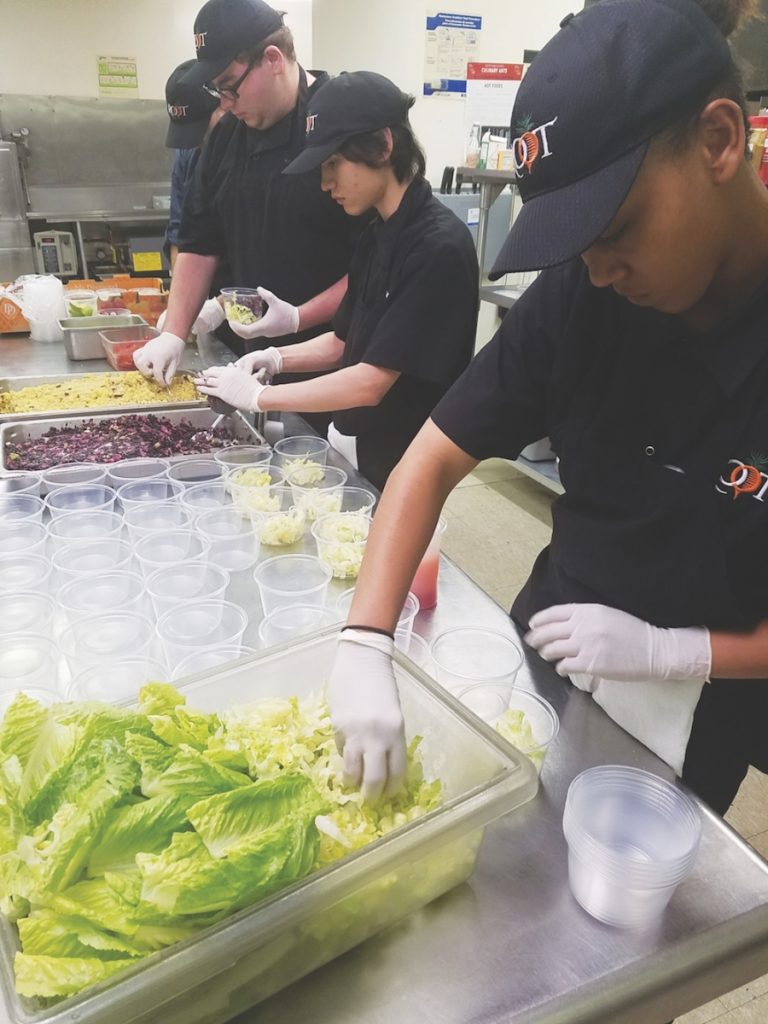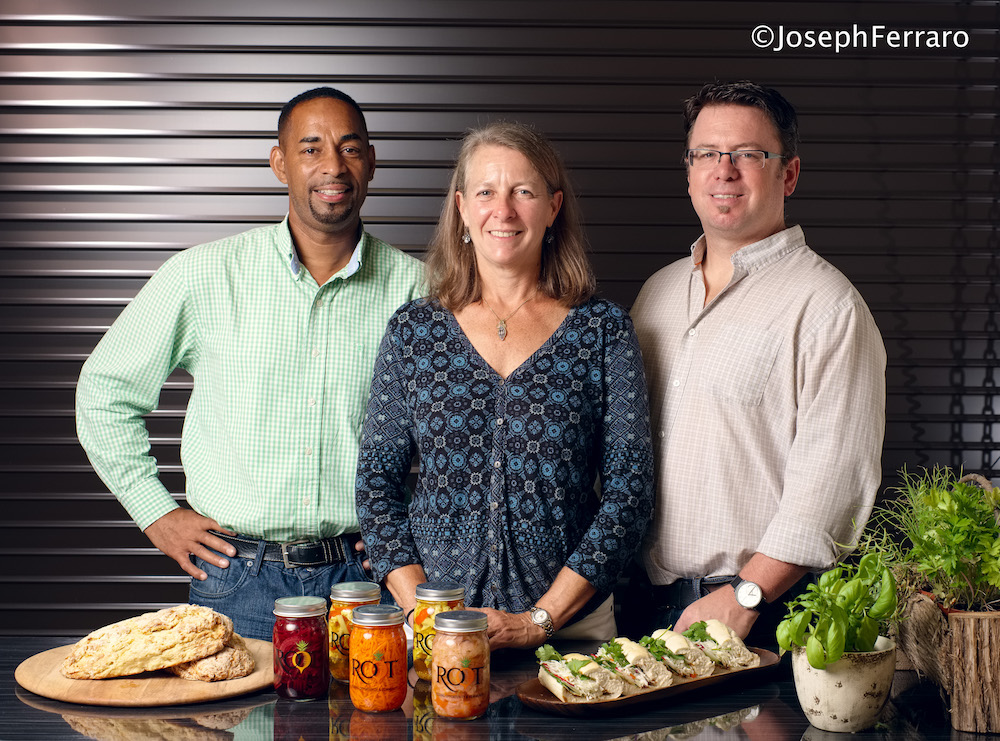“The great thing about Root . . .”
is a phrase Selvin Chambers uses freely and often. The brand-new program’s executive director shows boundless enthusiasm for his work. “Root is about the intersection of youth, community, and food—and that’s the core of who I am,” says Chambers.
The agency’s tagline is “feeding opportunity and community,” and its mission is to provide culinary and hospitality training to underserved young people ages 16 to 24. The 12-week program uses food as a teaching tool and exposes participants to every aspect of the restaurant business. “We give them both a front- and back-of-house experience, so when they are through, they can make an informed decision about which part of the industry they want to be in,” Chambers explains.
Working alongside master chef Sam Hunt, they learn how to prepare food, plan menus, handle deliveries, and provide customer service. “Our whole program is structured around honing their skills using food as a vehicle,” notes Chambers, adding that they also acquire “soft skills” such as resume writing, interviewing and communication, public speaking, and dressing for success. They even earn food handler and food allergen certifications, which gives them a leg up when it comes time to pursue employment.
While at Root, participants devise both a 12-week and a three-year goal plan meant to help them paint a realistic picture of what they can accomplish. “We don’t push dreams. We want to manage the dreams and show them what they can actually do.. .. Not everybody is going to be a chef,” Chambers explains, adding that graduates will be tracked for three years. (Data shows that if a disenfranchised young person has completed a training program and has held a position for three years, then they have the skills to “keep moving forward.”)
Part of the programming includes an eight-week externship with a local restaurant or catering business. The inaugural group of participants were offered training opportunities at the Boston Hot Dog Company, Flatbread Company, Smokin’ Jim’s House of Bar-B-Q, Hawthorne Hotel, and Jodi Bee Bakes. The November cohort will have exposure to culinary stars such as Gordon Hammersley, Nina Simonds, Frank McClelland, Mark McDonough of the Serenitee Restaurant Group, Nico Monday and Amelia O’Reilly of The Market Restaurant, and Vinwood Catering.

Of the population they serve, Chambers says: “Most people would call them ‘at risk,’ but we don’t use that term.” As someone who grew up in a housing project, the label “at risk” didn’t resonate with Chambers when he was young. “Our young people understand ‘opportunity.’ We don’t call them clients or students or participants. We call them program partners. We feel we are responsible for 50 percent of their professional growth and development, and they are responsible for the other 50 percent—it’s a partnership.”
Root founder Jennifer Eddy makes the point that it can be a challenge to get young people who are facing terribly difficult circumstances to commit to something long-term. “That will probably be the most difficult thing—finding those kids and keeping them engaged,” she says. “But we have so many community support mechanisms that will help reduce some of those challenges and risks.” Key to that support network are the volunteer mentors with whom Root connects young people.
Participants are typically either in high school or working toward earning a GED, now called HiSET. However, by diversifying the times during which programming is offered—mornings, afternoons, evenings, and Saturdays—the program leaders hope to cater to multiple case scenarios, including young people who have graduated, low-income adults, and 16- to 28-year-olds for whom there are not a lot of programs on offer. “You have to focus on the mission and the task at hand, but there are so many possibilities,” says Eddy, noting the need, too, for more community commercial kitchens.
Chambers and his team take a very intentional approach to finding young people who could benefit from the program. They contact agencies already serving their target population, and they are creative about making their offerings visible in the community. By casting a wide net, they’ve developed a network of partners that includes the District Attorney’s Office, Mayor Kim Driscoll, Salem Public High School, North Shore Community College, Endicott College, Youth Build, LifeBridge, the Department of Transitional Assistance, the Department of Children and Families, and numerous restaurant owners.
Root is what’s known as a social enterprise. “What’s appealing to people is that it’s a nonprofit that is running a business to help support its mission. The revenue generated is plowed right back into the mission,” Eddy says, noting that the hardest piece for nonprofits is sustainability; they have a high fail rate. Because this model generates revenue, there’s less reliance on the same donor sources.

With respect to Root’s genesis, Eddy recalls her time spent traveling in Cambodia. It was there that she stumbled across a training restaurant run by a Swiss couple, who were responding to a trend they noticed of young people aging out of a nearby orphanage who had no skills and nowhere to live. Haven was built to help. Eddy was impressed with the diverse set of “wraparound” skills Haven provides, as well as the facility’s capacity to serve the mission. “I got goose bumps being there—seeing those young people working together so excitedly.” Upon returning home, she did some research to determine if there was a need on the North Shore for a similar enterprise. There was. So, she looked at Liberty’s Kitchen in New Orleans as a model; other sources of information and inspiration include Seattle’s Catalyst Kitchens and DC Central Kitchen in Washington, D.C.
Eddy also researched the restaurant industry’s own needs. She contacted local chefs and restaurateurs to find out if they would be interested in a program that produces skilled hands. The answer was a resounding yes. “There is a crisis on the North Shore and in Boston—they cannot find enough staff. . . . Some restaurants and hotels are opening late or running their kitchens half-staffed,” says Eddy. “Top restaurant owners and chefs are very excited about this program.”
Root is housed in a former garment factory located in Salem’s Shetland Park. The space has a fresh, industrial-chic vibe and a front-row view of the harbor. With enormous gratitude to Windover Construction—which completed much of the work pro bono—Chambers explains that the space, in and of itself, is part of the enterprise; it consists of a commercial kitchen, a cafe, a classroom, and an event space large enough to hold 300 people. “We use the entire facility as a vehicle for training. On a given day, we might have five people in the kitchen preparing for an event, three people working in the cafe, and five people working on their resumes and public speaking skills in the classroom.”
The space will not only serve Root programming but will also be open to the general public to rent for weddings, business meetings, corporate celebrations, etc. Catering services will be provided by Root as well as three other local caterers to diversify menu offerings. The revenue that is generated will go right back into the program. “We also plan on having weekly pop-up lunches so folks who purchase food from our takeout cafe can sit down and enjoy the space,” notes Eddy.
And what do the program partners have to say about all of it? For at least two of them, what is at the root of Root is food. Eighteen-year-old Jarelys wants to be a baker and says, “My favorite thing was making my Nutella Fingers for a Root event.” And Aniyar, 19, is pleased to add braised pork to her repertoire of dishes. Both are well on their way to a career in the culinary arts.
Root

